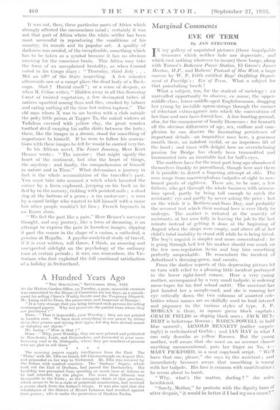Marginal Comments EVE OF TERM
By JAN STRUTHER
IN my gallery of unpainted pictures (those impalpable treasures which neither fade nor depreciate, and which cost nothing whatever to insure) there hangs, along with Turner's Battersea Power Station, El Greco's James Maxim?, M.P., and Rubens' Portrait of Mae West, a large canvas by W. P. Frith entitled Boys' Outfitting Depart- ment at Porridge's : Eve of Term. What a subject for that painstaking brush I What a subject, too, for the student of sociology : an unrivalled opportunity to observe, en masse, the upper- middle-class, lower-middle-aged Englishwoman, dragging her young by invisible apron-strings through the morass of reluctant extravagance into which the conventions of her time and race have forced her. A fine hunting-ground, also, for the connoisseur of family likenesses : for beneath all the obvious differences of age, sex, coiffure and com- plexion he can discern the fascinating persistence of important details—an inquisitive nose here, a generous mouth there, an indolent eyelid, or an imperious lift of the head ; and trace with delight how an overwhelming passion for Bridge has clearly been transmitted and transmuted into an insatiable lust for bull's-eyes.
The mothers have for the most part long ago abandoned themselves frankly to parenthood, though here and there it is possible to detect a lingering attempt at ell e. The sons range from macrocephalous tadpoles of eight to raw- boned giants of eighteen. There are, to be sure, a few fathers, who get through the whole business with miracu- lous speed, partly by being tall enough to catch the assistants' eye and partly by never asking the price : but on the whole it is Mothers-and-Sons Day, and probably the severest test which their mutual love is ever likely to undergo. The mother is irritated at the scarcity of assistants, at her own folly in leaving the job to the last minute instead of getting it done at the beginning of August when the shops were empty, and above all at her child's total inability to stand still while he is being fitted.
The boy's anguish is simpler and more concentrated : lie is going through hell lest his mother should run amok on the few non-regulation items and buy him something perfectly unspeakable. He remembers the incident of Arbuthnot's dressing-gown, and sweats.
From the darker aspects of this depressing picture let us turn with relief to a pleasing little incident portrayed in the lower right-hand • corner. Here a very young mother, accompanied by a very small tadpole, is ordering name-tapes for his first school outfit. The assistanthas just handed her a sample-card, and she is running her eye critically down the two columns of assorted cele- brities whose names are so skilfully used to lend interest and piquancy to the various styles of type. J. P.
MORGAN is there, in square green block capitals ; GRACIE FIELDS' in sloping black ones ; JACK HUL- BERT is heliotrope Roman ; BADEN-POWELL in bold blue sanserif.; ARNOLD BENNETT (rather surpris- ingly) is ecclesiastical Gothic ; and IAN HAY in what I can only describe as yellow Rococo. But the young mother, well aware that she must on no account choose anything unconventional, puts her finger on No. 4-- MARY PICKFORD, in a neat copybook script. • " have that one, please," she says to the assistant ; and immediately becomes aware that something is wrong with her tadpole. His face is crimson with mortification ; he seems about to burst, " Why, what's the matter, darling ? " she asks, bewildered.
"Surely, Mother," he protests with the dignity born of utter despairs "it would be .better if I had my own name?














































 Previous page
Previous page